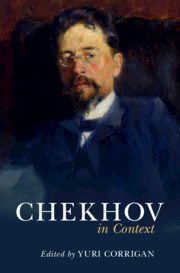Book contents
- Chekhov in Context
- Chekhov in Context
- Copyright page
- Contents
- Figures
- Contributors
- Foreword
- Note on Texts, Dates, and Transliteration
- Chronology
- Introduction
- Part I Life
- Part II Society
- Part III Culture
- Part IV Literature
- Chapter 21 Print Culture
- Chapter 22 Embarrassment
- Chapter 23 Tolstoy
- Chapter 24 French Literature
- Chapter 25 Modernism and Symbolism
- Chapter 26 Theatrical Traditions
- Chapter 27 Modern Theater
- Chapter 28 Chekhov’s Moscow Art Theater (1897–1904)
- Part V Afterlives
- Notes
- Further Reading
- Index
Chapter 22 - Embarrassment
from Part IV - Literature
Published online by Cambridge University Press: 16 February 2023
- Chekhov in Context
- Chekhov in Context
- Copyright page
- Contents
- Figures
- Contributors
- Foreword
- Note on Texts, Dates, and Transliteration
- Chronology
- Introduction
- Part I Life
- Part II Society
- Part III Culture
- Part IV Literature
- Chapter 21 Print Culture
- Chapter 22 Embarrassment
- Chapter 23 Tolstoy
- Chapter 24 French Literature
- Chapter 25 Modernism and Symbolism
- Chapter 26 Theatrical Traditions
- Chapter 27 Modern Theater
- Chapter 28 Chekhov’s Moscow Art Theater (1897–1904)
- Part V Afterlives
- Notes
- Further Reading
- Index
Summary
Caryl Emerson distinguishes Chekhov from the nineteenth-century Russian prose tradition of Gogol and Dostoevsky through his specific evocation of embarrassment, an emotion so ubiquitous in Chekhov’s writing as to become fused with his poetics and his worldview. While Dostoevsky and Tolstoy built their plots on more assertive acts and emotions, Chekhov, as Emerson shows, runs his path to redemption and discovery through the moral capacity to cringe at one’s own words and behavior.
Information
- Type
- Chapter
- Information
- Chekhov in Context , pp. 170 - 176Publisher: Cambridge University PressPrint publication year: 2023
